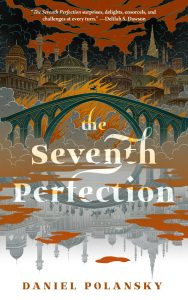THE SEVENTH PERFECTION by Daniel Polansky (Book Review)
 The Seventh Perfection is the second Polansky novella I’ve read, after the wonderfully high (or is it low?) concept The Builders, a revenge Western starring anthropomorphic animals. This new one is even more highly conceptual, and quite a bit more ambitious, but in the end I found it – like The Builders – just lacking a degree or two of that perfection* that would have lodged it firmly among my favourite fantasy novellas. However, it’s still hugely impressive and well worth a read, especially if you’re after something a little more unique than the standard fantasy fare.
The Seventh Perfection is the second Polansky novella I’ve read, after the wonderfully high (or is it low?) concept The Builders, a revenge Western starring anthropomorphic animals. This new one is even more highly conceptual, and quite a bit more ambitious, but in the end I found it – like The Builders – just lacking a degree or two of that perfection* that would have lodged it firmly among my favourite fantasy novellas. However, it’s still hugely impressive and well worth a read, especially if you’re after something a little more unique than the standard fantasy fare.
The high-concept here is in the telling, which is not exactly epistolary, but rather told in a series of one-way dialogue-monologues – that is, the transcript of only one part of each dialogue, rather than pure monologues or letters. The words on the page are what the characters say to the main character, but what the main character says is only ever implied.
Neat, huh?
Obviously, it’s a bit artificial, a bit gimmicky, and leaves some gaps…but it’s definitely an interesting approach. I don’t mind a gimmick, now and then, and this one fits the story, which is about memory (the titular seventh perfection), and perception. The lead character, Manet the Amenuensis, has a perfect memory as a result of intense training at the mysterious White Isle, and therefore the book reflects their first-hand, verbatim experiences. You also get the sense that their training (or perhaps aptitude) has left them unable to read into human reactions very much, such is the perfection of their recall.
As the investigation proceeds the author paints a picture of a city and society recovering from recent upheaval, where technology blesses some with a good life but where some still struggle at the margins. It’s a vaguely Asian-seeming setting, but not explicitly anything, and the technology level seems a mix as well – there are programmed part-human constructs, rare ray guns, bustling trams(?), and a reasonably modern urban society. However, all we get are glimpses and second hand comments – due to the nature of the narrative we are never told.
As a result, the reader is a participant in the investigation, picking up clues and piecing them together along with the investigator – but also beyond them, because you know a lot less to start with. Not everything is answered, either, and this is probably a book that will reward a few readings. Each character is given a fairly distinct voice, but, in the novella format, few of them are given a chance to unfold beyond a brief impression – even the protagonist, if I’m honest. In retrospect, this was the main thing lacking in The Builders as well, whereas other recent reads like Ring Shout and The Four Profound Weaves have managed to work rounder characters even into similar lengths.
But this is more a book about ideas – about revolutions, the myth-making that surrounds them, their sacrifices and imperfections, and, as quite a cynical book, their ultimate futility. The ideas and the way they are told are compelling, as are the hints at a wider world, but more than the experimental storytelling style, it’s the short format that doesn’t quite give the ideas enough room to fully evolve. Especially (and here’s a slightly spoilery bit, so don’t read the next few words if you want to remain entirely clueless about the ending)…especially because it ends so damn abruptly. I was expecting another chapter, or at least a few more paragraphs, to the point where I thought perhaps my ARC was incomplete. The last 7% of my sample was taken up by acknowledgements, and a lot is left hanging.
I wrote before that novellas can either seem like short novels or long short stories, and this is clearly the latter. More ambiguity is allowed in short stories – and perhaps also in literary novels – than we often get in speculative fiction; but since this is a genre of ideas as well as adventure, it did feel like this left too many of those ideas hanging, the arc of the story launched but still not quite touched down. Perhaps that was what the author wanted to achieve, and I was just unprepared not to be landed gently instead of having to make the last bit of the journey on my own.
But either way, it was worth the journey, and I would definitely recommend this to anyone looking for something different, something challenging, something you’re happy to put a bit of effort into.
The Seventh Perfection publishes on 22 September 2020 from Tor.com. (Many thanks to the publisher and Netgalley for the ARC.)
(* Sorry.)
